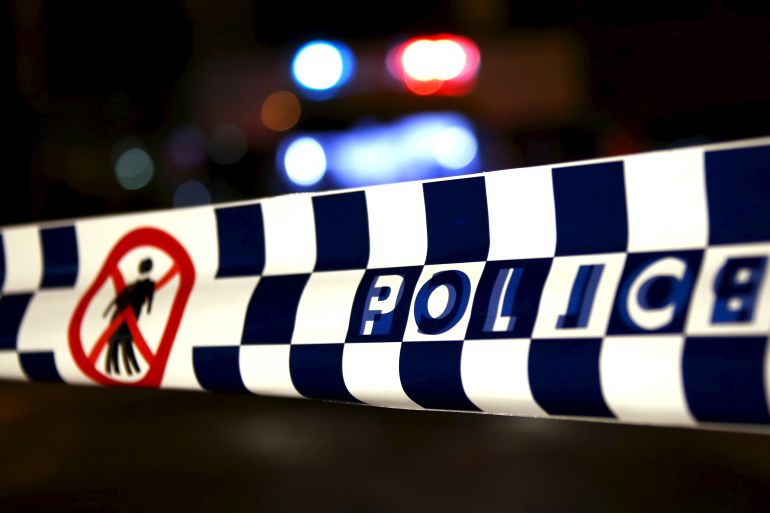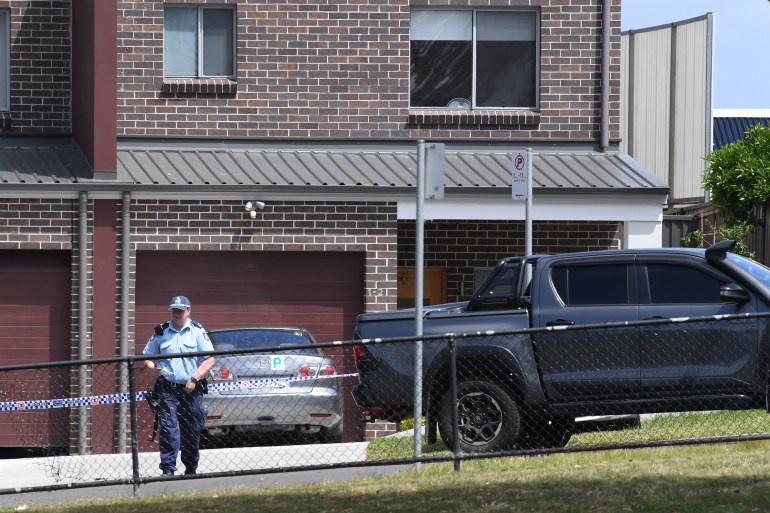‘Everyday life now’: Sydney reels from organised crime turf war
Police swoop on drug gangs in Australia’s biggest city but lawyers fear controversial law changes will leave minorities vulnerable.

Last week, a home in Sydney’s southwest was sprayed with bullets during a drive-by shooting.
No one was injured, although it was the second time in six months the house had been targeted and came after three assassinations over three weeks and a total of 13 in two years.
Keep reading
list of 4 itemsWill Labor govt in Australia put climate change at the forefront?
Who is Anthony Albanese, Australia’s PM-elect?
Australians ‘uniformly worried’ about economy on election eve
“What can you do? It’s everyday life now,” a neighbour who heard the shots told a local TV station.
Many of these killings are attributed to a highly-publicised turf war between two crime gangs – the Alameddine Family and the Hamzy clan.
The war has intensified in recent months after the Alameddines joined forces with the Comancheros, Australia’s biggest outlaw motorcycle gang, to wrest control of Sydney’s lucrative drug trade by eliminating the competition.
The partnership is already bearing fruit for the criminals. Among the most recent fatalities are Mejid Hamzy, a brother of Brothers 4 Life kingpin Bassam Hamzy, teenager Salim Hamzy and his father Toufik, who were gunned down in their driveway.
Days after the latest shooting, police set up Taskforce Erebus to put an end to the tit-for-tat shootings and a lid on organised crime. They also began using controversial new laws that allow the search of ‘serious’ drug convicts on the streets or in their homes without warrants.
In the first week of the operation, a “smorgasbord of drugs” including trafficable quantities of heroin, ecstasy and the methamphetamine ‘ice’, eight illegal firearms, 36 “drug-dealing mobile phones”, and close to one million Australian dollars ($710,000) in cash was seized. Thirty-one people have been arrested, including three teenagers.
“These are not ordinary people. They are scumbags and they are a scourge on our society,” NSW Police Minister Paul Toole said at a media briefing. “We are going to get on top of this and wipe out this insidious behaviour.”

Whether Taskforce Erebus actually wipes out or even de-escalates gang warfare in Sydney remains to be seen.
“We are not getting an enormous amount of help from people in that crime scene,” NSW Police Detective Chief Superintendent Darren Bennett said at a media briefing following the most recent shooting. Such ‘walls of silence’ are common themes. With the exception of Mejid, four out of five of the Hamzy murders remain unsolved.
‘Turning a blind eye’
Opposition police spokesperson Walt Secord says police allowed organised crime to flourish in the state over the past two years as they were too preoccupied with COVID-19 responses that saw thousands of regular citizens targeted, fined or detained for breaching public health orders. He also accuses the government of accepting that shootings are part of life in Sydney’s working-class west.
“If there had been homicides in Sydney’s [affluent] east or the city’s North Shore, the government would have had a much more prompt … response,” Secord told the Sydney Morning Herald.
CEO of the Australian Federation of Islamic Councils Keysar Trad, who has counselled relatives of shooting victims, voices similar sentiments.
“We have seen what happens in Arabic countries like Egypt where [President Abdel Fattah] al-Sisi pardoned the biggest gangsters when he came to power. Australia is nothing like that, but why do we tolerate gangs that demand protection from shopkeepers,” he told Al Jazeera, referring to a well-documented phenomenon in Lakemba and other parts of western Sydney with large Arab migrant populations. “It shows how criminal elements are indirectly helped by the majority turning a blind eye to their crimes. It allows criminals to flourish.”
He adds: “People often ask me ‘What is the Muslim community doing about this?’ I tell them either we [Muslims] are Australians or we are not? And if we are, this is a social problem and we need to work together as a society to solve it. Crime is not more prevalent in the Muslim community. It’s a symptom of demographics.”
A senior associate for Sydney Criminal Lawyers, Fahim Khan believes Erebus will be quite effective in the first few months.
“There will also be a temporary lull in shootings,” he told Al Jazeera.
“But then it will resume and the long-term consequences of the new law that allows searches without warrants will be more police harassment. Because when you look at it carefully, the law doesn’t require a person of interest to be convinced of a serious drug matter. Being caught with as little as five ecstasy pills will be enough. And the law will not be applied evenly but targeted to specific localities and ethnicities. You just have to look at how COVID laws were enforced in south west Sydney compared to the North Shore where wealthy non-minorities live.”
NSW Police Force investigators have executed 29 search warrants, arresting 18 people, as part of the resolution to a 10-month investigation into a sophisticated ‘dial a dealer’ syndicate responsible for distributing cocaine and other illicit drugs across NSW. pic.twitter.com/E7qn0H6CQv
— NSW Police Force (@nswpolice) May 24, 2022
The Alameddine crime family has been targeted by NSW Police in a series of raids, with authorities saying they have cut the “head off the snake” | @danielsutton10 #nswpol pic.twitter.com/QSu2HhmA8p
— 10 News First Sydney (@10NewsFirstSyd) May 24, 2022
Khan argues the solution to gangland warfare should be three-fold. First, Taskforce Erebus should place more focus on intelligence gathering and surveillance of people of interest instead of “breaking down doors in the middle of the night”.
Second, the lack of trust in law enforcement, which Khan says is caused by “over-policing, some corrupt police and police failure to properly comply with judicial procedures”, must be addressed. And third, there must be more investment in drug rehabilitation and education.
NSW Police refused to answer any of Al Jazeera’s questions about the appropriateness of the force’s response. However, Trad of the Australian Federation of Islamic Councils said “it is wrong to say” NSW police are not reacting constructively.
“Our police are pretty good at investigating and getting to the root of things. The problem is they are not well funded because there is too much focus on reducing taxes,” he says. “We need to be willing to pay enough tax for police to stop these shootings and the same applies to education. We do not have a healthy teacher-student ratio. We do not address serious misbehaviour by identifying problem children and giving them counselling.
“If the public doesn’t start to invest in a strong education system and police force, we are going to see a slow decay of society where gang elements become a secret side of the way politics is run,” he says. “Nobody wants an Australia like that.”